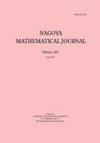NEW MODULI SPACES OF ONE-DIMENSIONAL SHEAVES ON
IF 0.8
2区 数学
Q2 MATHEMATICS
引用次数: 0
Abstract
Abstract We define a one-dimensional family of Bridgeland stability conditions on $\mathbb {P}^n$ , named “Euler” stability condition. We conjecture that the “Euler” stability condition converges to Gieseker stability for coherent sheaves. Here, we focus on ${\mathbb P}^3$ , first identifying Euler stability conditions with double-tilt stability conditions, and then we consider moduli of one-dimensional sheaves, proving some asymptotic results, boundedness for walls, and then explicitly computing walls and wall-crossings for sheaves supported on rational curves of degrees $3$ and $4$ .上一维轮轴的新模空间
摘要在$\mathbb {P}^n$上定义了一类一维桥地稳定性条件,称为“欧拉”稳定性条件。我们推测相干轴的“欧拉”稳定性条件收敛于Gieseker稳定性。本文以${\mathbb P}^3$为中心,首先确定了具有双倾斜稳定性条件的欧拉稳定条件,然后考虑了一维滑轮的模,证明了一些渐近结果,证明了墙体的有界性,然后显式地计算了在$3$和$4$有理曲线上支撑的滑轮的墙体和过墙。
本文章由计算机程序翻译,如有差异,请以英文原文为准。
求助全文
约1分钟内获得全文
求助全文
来源期刊
CiteScore
1.60
自引率
0.00%
发文量
31
审稿时长
6 months
期刊介绍:
The Nagoya Mathematical Journal is published quarterly. Since its formation in 1950 by a group led by Tadashi Nakayama, the journal has endeavoured to publish original research papers of the highest quality and of general interest, covering a broad range of pure mathematics. The journal is owned by Foundation Nagoya Mathematical Journal, which uses the proceeds from the journal to support mathematics worldwide.

 求助内容:
求助内容: 应助结果提醒方式:
应助结果提醒方式:


